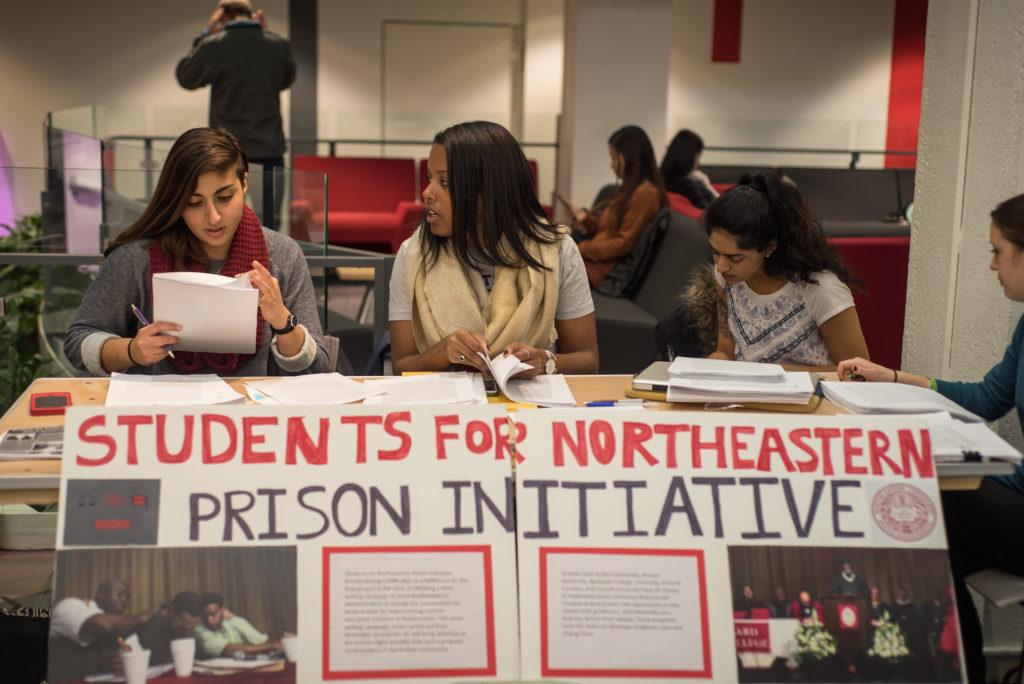By Cassidy DeStefano, news correspondent
A letter-writing campaign that launched in late November is advocating for Northeastern University (NU) to join other higher-education institutions in eventually offering degree and certificate programs to inmates.
Third-year students Erin Hock and Kailyn Gaines are leading the initiative to extend educational opportunities, including on-site class instruction and job training in non-trade professions, to inmates at local prisons.
“College education does a lot for prisoners in terms of giving them new opportunities, tools and the Headline
By Cassidy DeStefano, news correspondent capacity to build a more meaningful life after release,” Gaines, a political science and communication studies major, said.
Hock explained that the campaign is in its early stages, but aims to gain support from NU senior officials including Criminal Justice and Criminology Director James Allen Fox and Vice President of Student Affairs Madeleine Estabrook, both of whom are included on a target list of 10 administrators.
“We have a huge issue with mass incarceration in this country and a lot of prisoners come from places where they’re almost on a conveyor belt to the criminal justice system,” Gaines said. “But right now, what we’re most interested in is just gaining more support and bringing the issue to the attention of students and administration. Right now, we just have to start small.”
Gaines added that NU would likely work in conjunction with Boston University’s pre-existing prison education program, which currently serves the Massachusetts Correctional Institution (MCI) Norfolk and MCI Framingham.
“From the people that I’ve talked to, the hardest part about starting a program like this is getting access to prisons,” Gaines said. “So that’s why we’re kind of hoping to work under the BU umbrella.”
Participants are eligible to earn a Bachelor of Liberal Studies in Interdisciplinary Studies upon completing the curriculum, according to the Boston University Prison Education Program website. Professors teach classes in the prisons on a volunteer basis.
Gaines hopes NU will open its own bachelor’s degree program to prepare inmates to pursue advanced education after release.
“Programs like these better equip [inmates] to look at the root of social problems and become agents of change,” Gaines said.
However, there would be a significant cost for the university to implement the program, especially it were to match the size of other university initiatives.
“If the program grows – as we hope it does – to the scale of other universities’ programs where faculty are paid for teaching courses in prisons or we offer a full Northeastern degree, there will certainly be a cost to educate inmates, just like there is a cost to educate students on campus,” Gaines said.
While Gaines said that the group hasn’t developed a financial plan yet, she hopes that funding will be something that the administration helps with if the program is picked up.
Hock and Gaines designed the campaign as a capstone project for their advocacy writing course, and they tabled in the Curry Student Center on Nov. 23 and Nov. 30 to accrue student support. Hock added that they intend to hand-deliver close to 300 letters on Dec. 3. to the list of 10 administrators.
“We didn’t start with a target number – with a letter-writing campaign, the sky is the limit, because the physical representation of the letter shows how much, and how many, individuals care about an issue,” Hock, a communications major, said.
She added that the size of the program would hinge on the approval of individual academic branches within the university.
“The amount of classes that we offer to them is up to the level of commitment and support that we can get from the university and also from the type of faculty,” she said. “Currently, we have the communications department on board, but we would need to individually appeal to other departments.”
Sophomore bioengineering major Conor Messer agreed that college classes can help ex-convicts transition back to working life after release.
“I think education for inmates is very important as they possibly get out and have to completely reestablish themselves in society, he said. “Northeastern developing a partnership would be a very good idea.”
However, there are limits to the proposed program, according to Hock. Ideally, the administration would design a model that would employ a vigorous application process for inmates, complete with tests and interviews.
“I think there should be some set of qualifications for it because you don’t want to be giving people that committed really serious crimes this opportunity,” Lauren Cataldo, sophomore international affairs major, said. “It should be for those who committed lesser offenses, people who will have the opportunity to leave prison in the future.”
Photo by Scotty Schenck









